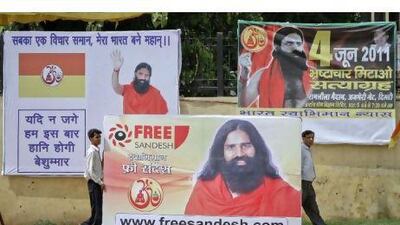NEW DELHI // India's government suffered a fresh blow yesterday in containing growing anger over corruption as a leading civil activist joined forces with an influential yoga guru in a "fast-until-death" against bribery and kickbacks.
The Swami Ramdev, India's most famous yoga guru, has pledged a hunger strike from Saturday to protest against corruption in India and called on his legions of followers to join him. Anna Hazare, whose fast in April struck a chord with millions of Indians and forced the government to make concessions on an anti-corruption bill, gave his support for Mr Ramdev's strike.
Investors worry that the latest troubles would again cause the government to pay less attention to business-oriented reform bills postponed because ofprotests over corruption.
Mr Hazare, whose hunger strike demanding an anti-corruption law triggered protests across India, said: "The government has tried to cheat us.
"I will support Baba Ramdev so that the government does not do what it did when we were fighting. We will fight together against corruption."
Such is Mr Ramdev's popularity that some of India's most powerful government ministers turned up at Delhi Airport to greet him on Wednesday and persuade him to call off the strike. They failed and were forced to carry out a second day of talks.
Mr Ramdev, who turned an ancient spiritual tradition into a mass-healing movement, runs a US$40million (Dh147m) a year global yoga and health empire, owns a Scottish island and claims that he can cure cancer.
Even prime minister Manmohan Singh personally appealed to Mr Ramdev, whose daily TV show attracts 30 million viewers, to call off the protest.
Mr Ramdev will begin his fast on Saturday in New Delhi and has predicted that 10 million people will join his protest. The protesters are hoping to convince the government to pass an anti-corruption law and set up a task force for repatriating illegal money held in foreign bank accounts by Indians.
Mr Singh's party has struggled to shake off a slew of corruption scandals, including a telecoms kickback scam that may have cost the government US$39 billion. The scandals have sparked public anger, hurt foreign investment and stymied economic reforms.
Ruling Congress party officials have questioned Mr Ramdev's links with the Hindu-nationalist Rashtriya Swayamsevak Sangh (RSS), the umbrella organisation of the main opposition Bharatiya Janata Party.
But Mr Ramdev has said his actions are apolitical, and some commentators said this kind of movement would gain little traction if it was not for widespread grassroots anger.
The anti-corruption activist and former police officer Kiran Bedi told CNN-IBN: "You will never have this kind of mass movement for the wrong reasons.
"One out of two Indians, according to surveys, is either a victim of corruption or perpetrator of corruption."
In a that sign the controversy sparked divisions within the government, Congress party general secretary Digvijaya Singh criticised the move to send ministers to meet Mr Ramdev because of his links to the RSS.
"Ramdev is quite a maverick, but many people will try to capitalise on his following. he principal opposition will always indirectly benefit," said Swapan Dasgupta, a former magazine editor.
Mr Hazare, who is in his 70s, ended his fast after five days when the government agreed to finalise a draft of a bill giving an independent ombudsman police-like powers to prosecute ministers, bureaucrats and judges.
More than 500 volunteers were busy sewing huge fabric drapes, erecting towers and setting up huge outdoor kitchens yesterday at the site of a 23,000 square metre tent in the capital where Mr Ramdev's fast will take place.
Shailesh Nage, a protest organiser, said: "India has potential but we are lost among corruption. Our aim is to increase the country's moral values."
Politicians fear that outrage over the scandals may turn into a national movement against the establishment.
India has largely remained unaffected by the violent protests that have rocked emerging economies in the Middle East and North Africa.
Corruption has long been a part of daily life, but the scandals, which have seen ministers jailed and business heavyweights questioned, are unprecedented.

